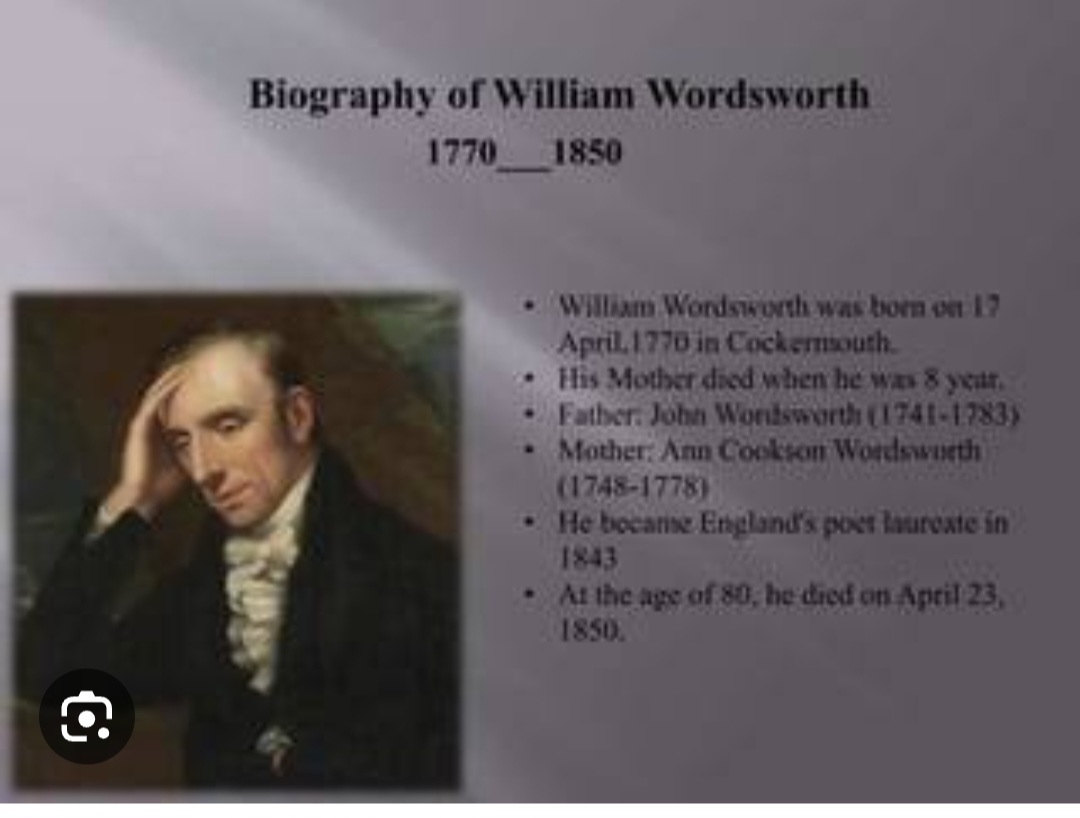Hello readers!!
I'm Divya jadav a student of English literature in MKBU.In this blog I want to share some ideas about the William Wordsworth " PREFACE TO THE LYRICAL BALLAD"
QUESTION: 1 EXPLAIN HOW FRENCH REVOLUTION INFLUENCED WILLIAM WORDS WORTH ROMANTICISM
ANSWER:-
The French Revolution had a significant influence on William Wordsworth and the development of Romanticism in his poetry. Wordsworth's poetry is often associated with the Romantic movement, which emphasized individualism, nature, and emotional expression. Here's how the French Revolution impacted Wordsworth's Romanticism:
1. Political Ideals: Wordsworth was initially inspired by the revolutionary ideals of liberty, equality, and fraternity. The French Revolution represented a fervent desire for social and political change, which resonated with Wordsworth's belief in the power of the individual and the potential for positive societal transformation.
2. Emphasis on Nature: The French Revolution's turbulence and violence led Wordsworth to seek solace in nature. He found refuge in the tranquility of the natural world, which he saw as a source of spiritual and emotional renewal. This emphasis on nature became a central theme in his poetry, as he believed that it could offer solace and inspiration in a rapidly changing world.
3. Return to Simplicity: In response to the excesses and complexities of the revolutionary period, Wordsworth, along with other Romantic poets, sought to return to a simpler, more authentic way of life. His poetry often celebrated the ordinary and everyday experiences of rural life, emphasizing the importance of simplicity and sincerity.
4. Individual Emotion and Imagination: The Romantic movement, influenced by the French Revolution's emphasis on individual rights and freedoms, placed a strong emphasis on the expression of individual emotion and imagination. Wordsworth's poetry often explored the inner emotional landscape of the individual, celebrating the power of imagination and the subjective experience of the world.
the French Revolution played a pivotal role in shaping William Wordsworth's Romanticism. It influenced his political and philosophical views, his connection to nature, and his emphasis on individual emotion and imagination in his poetry. Wordsworth's works, such as "Lines Composed a Few Miles Above Tintern Abbey" and "I Wandered Lonely as a Cloud," reflect these influences and remain important examples of Romantic literature.
QUESTION:2 WRITE NOTE ON SELF CONTRADICTORY OBSERVETION IN PREFACE
ANSWER:
In William Wordsworth's Preface to "Lyrical Ballads," there exists a notable self-contradictory observation that reflects the complexity of his poetic principles. Wordsworth initially champions simplicity and the use of everyday language in poetry, emphasizing a close connection between the poet and nature. He asserts that poetry should be written in "the real language of men" and should avoid artificial and ornate language.
However, this seemingly straightforward principle becomes contradictory when Wordsworth acknowledges the necessity of poetic diction and elevated language for certain moments of heightened emotion or imagination. He admits that poets may resort to a more grandiose style in such cases. This apparent contradiction in advocating both simplicity and elevated language illustrates the tension within Wordsworth's own poetic theory.
This self-contradictory observation suggests that Wordsworth recognizes the need for a balance between the ordinary and the sublime in poetry. It highlights the dynamic nature of his beliefs and the recognition that poetic expression cannot always adhere strictly to one set of principles. Wordsworth's preface, in essence, underscores the complexity and evolution of his own poetic philosophy over time.
QUESTION: 3 WRITE BRIFE ANALYSIS OF ANY ONE SHORT POEM BY WORDSWORTH WITH REFERENCE TO HIS POETIC CREED
ANSWER:
William Wordsworth's most famous poems that reflects his poetic creed is "I Wandered Lonely as a Cloud," also known as "Daffodils." This poem is a quintessential example of Wordsworth's Romantic ideals.
In this poem, Wordsworth describes a personal experience where he encounters a field of daffodils while wandering in nature. He vividly portrays the scene and the emotions it evokes. The poem highlights several key aspects of Wordsworth's poetic creed:
1. Connection with Nature: Wordsworth believed in the spiritual and emotional connection between humans and nature. In "Daffodils," he immerses himself in the beauty of the natural world, finding solace and inspiration in the simple yet profound sight of the daffodils.
2. Emotion and Imagination : Wordsworth valued the power of emotions and the imagination in poetry. He conveys the sense of joy and tranquility he experiences when gazing at the daffodils, emphasizing how this memory later brings him comfort in moments of solitude.
3. Simplicity and Common Language: Wordsworth advocated for using everyday language and simple, direct expressions in poetry. In this poem, he employs plain language to convey profound emotions and experiences, making it accessible to a wide audience.
4. Spontaneity and the Sublime: Wordsworth believed in the importance of spontaneous, unmediated experiences with nature. The poem captures a moment of sublime beauty, where the daffodils "flash upon that inward eye" and fill his heart with bliss.
Overall, "I Wandered Lonely as a Cloud" embodies Wordsworth's belief in the transformative power of nature, the emotional resonance of poetry, and the idea that ordinary experiences can hold extraordinary significance when viewed through the lens of the imagination. It is a testament to his Romantic ideals and remains a celebrated work in the canon of English literture.
Thankyou for visiting......💐💐
Refrence of cite: Chat GPT









